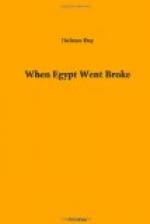He stepped out in front of Elias when the latter came near. Britt shook the roll of drawings under the Prophet’s nose. “Listen here, my man! I didn’t bother to talk to you a few minutes ago. Now I’m talking. You’ve been a vagabond in this town for a long time. The only thing that has protected you from the law in such cases made and provided has been the roof of a man who ought to be a tramp along with you. Right now, before the eyes of a dozen citizens, you have committed two separate and distinct breaches of the law. You have trespassed on my property. In the past I have sent men to jail for sixty days for one offense of that sort. On my complaint, backed by these witnesses, you’ll see sixty days on one case—and I’ll have you re-arrested on the other count the moment you step foot out of the jail.” He paused.
“Yes?” said the Prophet, mildly inquiring.
“I’m a fair man, and I call the attention of these witnesses to what I say now. I’ll give you a chance. Walk out of this town and stay out, and I’ll not prosecute.”
The Prophet shook his head.
“Do you refuse to go?”
For a man who dealt so exclusively in texts, the Prophet was rather vulgarly blunt when he replied, “You bet!”
Britt received that manner of retort with the air of a man who had been tunked between the eyes. It was some moments before he could go on. “Don’t you realize what the judge will say when I show up your willfulness?”
The Prophet was even more amazing in his new manners. He stuck out his tongue, put his thumb to his nose, and wriggled his fingers.
“Well, I’ll be condemned!” Britt gasped.
“Sure! When all the evidence is in about you!”
The magnate of Egypt lowered the roll that he had brandished so constantly. After a few moments of silent challenge with the eyes, he turned and walked away.
But he heard the mumble of men’s laughter behind him, and his anger and the determination not to be put down in this style in his own town helped him to get back some of his self-possession. He whirled on his heels and strode to the enigma of Egypt.
“Who are you, anyway?” he demanded.
But Prophet Elias was his usual self once more. He had assumed that air which a practical man like Britt found an aggravating, teasing pose or a kind of lunacy with which common sense could not cope. Elias slowly spread his umbrella. He stood beneath it and declaimed:
“’And Moses and Aaron did all these wonders before Pharaoh; and the Lord hardened Pharaoh’s heart, so that he would not let the children of Israel go out of his land.’”
“You let me tell you something! There’s one man going out of this land mighty sudden—and he’s going to the county jail in charge of a constable.”
When Britt started away that time he kept on going. He went to the office of Trial-Justice Bowman and swore out a warrant. A constable served it and the Prophet was haled before the justice. On the evidence presented, Bowman sentenced a person known as “the Prophet Elias” to serve sixty days in the county jail. Within an hour after the Prophet’s defiance he was on his way with the constable in a side-bar buggy.




